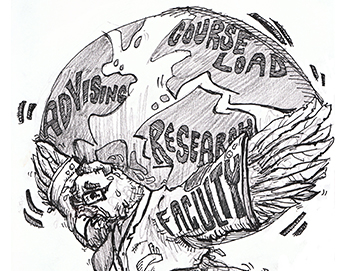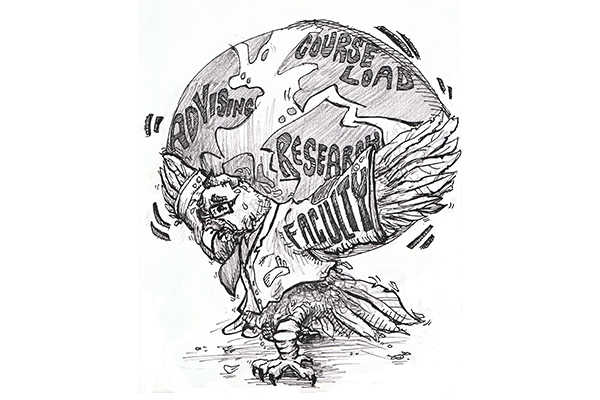
 Faculty did not just begin voicing concerns about their workload this spring. As the college’s operating budget continued to be scraped down to the barest bones, the number of faculty decreased and the pressure on the remaining members became intense. With a $6.3 million deficit in the last fiscal year bringing professors’ expanding faculty struggles to balance scholarship, teaching and advising loads, administrators began making moves to assess what could be done to help the staff.
Faculty did not just begin voicing concerns about their workload this spring. As the college’s operating budget continued to be scraped down to the barest bones, the number of faculty decreased and the pressure on the remaining members became intense. With a $6.3 million deficit in the last fiscal year bringing professors’ expanding faculty struggles to balance scholarship, teaching and advising loads, administrators began making moves to assess what could be done to help the staff.
One year later, not much appears to have changed.
We at The New Paltz Oracle are glad that college officials recognize that faculty have become overworked, but we hope that progress will be made to address the issue in a more timely fashion.
President Donald Christian and other administrators said they were beginning a study on faculty workload last year. The issue was and remains to be as complex as they said it is: measuring a professor’s workload means more than counting the number of courses they taught in a given semester or how many students were in their classes. Statistics cannot measure how well a faculty member advised their students, whether they were responsible for 20 or 200. Therefore, it is understandable that a study of faculty workload has and will take a long time to conduct and review.
The constant carousel of our top-ranking administrators certainly doesn’t help. Christian himself was only recently named the full-time president, and we are still in search of three major academic officers who would play important roles on this task force.
However, this does not change the fact that faculty are still stressed now. Portions of the $900,000 cuts to the part-time instructional budget still need to be enacted, according to the president; more adjuncts will have to be let go. The college is still reeling from the effects of past cuts in funding from the state government, and we will be for a while. Those left behind have to recover, and they can’t just wait for a study to be completed. They need administrators to begin acting now to relieve the stresses brought upon them from budget cuts and/or increased expectations to teach more students, begin more research and have more advisees. Perhaps there is no hard data to support the idea that workload has increased, but we hope that faculty testimonials about their struggles will be enough to cause concern at all levels of the college.
Problems associated with faculty workload have been brought up constantly by the United University Professions (UUP) union. We applaud the union for keeping this problem on the minds of everyone in the campus community through events like next week’s forum and through their own publications.
We are also impressed that UUP has already sent out a survey about workload issues. We understand that administrators want their survey to be as thorough and well designed as possible, but perhaps getting some feelers out as soon as UUP has would be a good idea. Thankfully, the president said administrators will be sending their survey out soon; hopefully, the wait will be worth it.
Members of the union have also brought up problems they and their peers are having with managing their work in labor management meetings with college officials. According to The Bullhorn, UUP members have said administrators have suggested that faculty have conversations with their direct supervisors that could involve saying no to requests to take on more work. We hope this means that higher-ups will be understanding if these conversations begin, as their necessity can already make faculty uncomfortable.
While the first part of the study — the survey that will be distributed to members of the faculty and then analyzed by a group of officials — is still in the works, we also hope faculty supervisors or deans will work to spread work as evenly as possible around their unit or department. It will take a while to evaluate this information, but the faculty needs to be helped now.
Students should remain concerned with this issue plaguing the people who are responsible for educating them. It’s simple: the more overworked your professors are, the less time they will have for providing you with individual attention.
It is unfortunate that this issue at the center of the educational process at any college is so difficult to get a handle on, and that the survey hasn’t gone out yet for that reason. We hope that although it has been a long year since the idea for this study was conceived, now there will be a steady stream of analysis and progress to find solutions to faculty workload-related problems.
